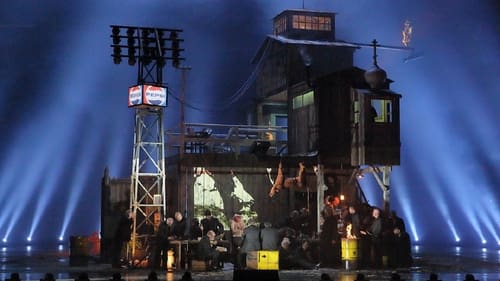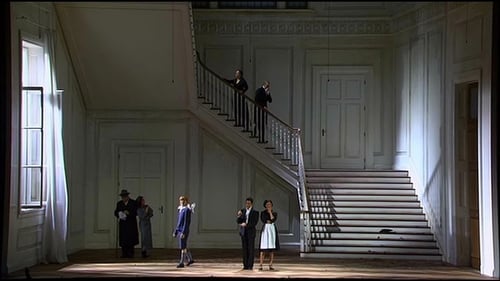
Dr. Schön / Jack the Ripper
Alban Berg explores the power that Eros and Thanatos, in their rawest forms, have over our lives: Lulu, a femme fatale, will do anything to get ahead in a man’s world, but she ends up being destroyed.

Titus
Titus and Berenice love each other; under the watchful eye of Antiochus, the hopeless lover, they try yet refuse to understand each other. Taking up the “majestic sadness” of these alexandrines, among the greatest verses in the French language, Michael Jarrell amplifies the power of words, making them a vehicle for spaces and identities that, from Rome to Jerusalem, are unceasingly questioned.

Shishkov
Stage director Frank Castorf “might have been born to direct From the House of the Dead” (Opera Today). His gritty, visually striking adaptation brings bold modern and postmodern touches to Janáček’s masterwork without ever overshadowing the intense forward momentum of the music, conducted to dramatic perfection by Simone Young and sung by an all-star cast in Munich. Janáček adapted Dostoevsky for this powerfully compelling opera set in a Siberian prison camp, full of starkly contrasting moods and motifs, unusual in its episodic structure. The last opera Janáček ever composed, its third act was on his desk when he died in 1928; attempts by his students to “complete” his orchestration have largely fallen away over the decades in favor of the original version. Despite the grimness of the setting and the brutality of several characters, the composer’s compassion shines through in tender moments, movingly illustrating his motto for the work: “in every creature, a spark of God.”

Hans Werner Henze’s “The Raft of the Medusa” is directly inspired by Théodore Géricault’s famous painting. The German composer sets to music the fate of 150 people who have been shipwrecked and abandoned to their destiny. This is a radical work that fluctuates between hope and inevitability, agony and sudden bursts of life. The Raft of the Medusa is an oratorio that was first performed in 1968. Fifty years on, the Italian director Romeo Castellucci underscores its immense modernity, drawing a striking parallel between Hans Werner Henze’s work and the current migrant crisis in the Mediterranean.

At the Bayerische Staatsoper in Munich, Kirill Petrenko conducts this new production of Alban Berg's Lulu, directed for stage by Dmitri Tcherniakov and starring the soprano Marlis Petersen (Lulu).

Der Graff
Richard Strauss' last stage work is an opera about opera as an art form, depicting the creation of a music drama in a wise and witty way. Which came first the words or the music? That is the question Strauss and his librettist Clemens Krauss address through the story of a Countess torn between a composer and a poet.

Jevgeni Onjegin
Described by Tchaikovsky as ‘lyric scenes’, Eugene Onegin receives a spectacular reinterpretation from the Norwegian director Stefan Herheim. His productions create controversy and excitement around Europe, and here he takes Pushkin’s story of illusion, disaffection and frustrated love, and places the protagonists – world-weary Onegin and naïve, passionate Tatyana – in a triple temporal perspective, referencing the theatrical present, the period of the work’s composition, and the pageant of Russia’s history. Mariss Jansons, renowned for his mastery of Tchaikovsky’s symphonies, conducts this performance from Amsterdam’s Muziektheater.

Don Giovanni
More than two centuries after its creation, the emotional pull of this supreme opera remains absolutely intact. Dmitri Tcherniakov duly revisits the myth and makes the seducer of Seville a ‘man without qualities’, a cipher whose words have a hypnotic power over women. His words will disrupt the proprieties ruling the Commandatore’s family. His words are also what makes Don Juan such a subversive figure and the embodiment of one of the most powerful modern European myths. Leading the Freiburg Baroque Orchestra is one of the best Mozart conductors, Louis Langrée. Bo Skovhus portrays a dispirited Don Giovanni, old playboy and anti-hero. Kyle Ketelsen is his servant Leporello, currently a shoe-in for this rôle. The superb female trio is composed of Marlis Petersen (Donna Anna), Kristine Opolais (Elvira) and Kerstin Avemo (Zerlina).

Don Alfonso
German director Claus Guth´s Mozart-Da Ponte trilogy was concluded at the 2009 Salzburg Festival with Cosí fan tutte featuring a starry cast including Miah Persson, Bo Skovhus, Isabel Leonard as well as Patricia Petibon. Adam Fischer conducts the Vienna Philharmonics.
Those familiar with Claus Guth´s previous work such as the psychoanalytic Nozze di Figaro, the Don Giovanni set amongst junkies in a wood in the middle of the night, the Ariadne who commits suicide on Naxos, Richard Wagners Tristan in love with Mathilde Wesendonck and a Walküre set in a miniature dolls house will know better than to expect a bubbly Mozartian comedy.

Riccardo Muti leads the Orchestra of the Wiener Staatsoper in this performance of Mozart's opera, recorded live in 1996. The performers include Barbara Frittoli, Angelika Kirchschlager, Angelika Kirchschlager and Michael Schade.

Kurwenal (baritone)
Glyndebourne's celebrated production of Nikolaus Lehnhoff's Tristan und Isolde is a supremely intelligent achievement; gravely beautiful, haunting and meditative, it is deeply reflective rather than visceral, fortified by Roland Aeschlimann's stunningly effective set, a womb-like space through which the protagonists move like gods. Conductor Jiří Bělohlávek mirrors Lehnhoff's approach in his sophisticated plumbing of the score's depths, with every shift in texture carefully laid bare by an inspired London Philharmonic Orchestra. Nina Stemme's Isolde and Robert Gambill's Tristan, both gloriously lyrical, are matched by superb performances from René Pape as the betrayed and vulnerable King Marke and Bo Skovhus as Kurwenal, deeply touching in his helpless devotion to Tristan. This High Definition recording of a production of uncommon intimacy reveals the opera's music and drama in a new light.

Graf Danilo Danilowitsch
Franz Lehár’s “Die Lustige Witwe” is reputed to be one of the most famous operettas in the world. Under the direction of the French Jerome Savary's the “Merry Widow” sparkles. At the first staging of this production at the Opera-Comique in Paris (Octobre, 2005) the singers appeared to be having as much fun as the audience. The Austrian Maestro Manfred Honeck presents his musical view on this operetta.

Il Conte Almaviva
This release contains the celebrated 2006 production of Mozart's Nozze di Figaro that was directed for the stage by Claus Guth at that year's Salzburg Festival. Ildebrando D'Arcangelo takes the title role, and gets support from Anna Netrebko as Sussanna, Bo Skovhus as Il Conte Di Almaviva, and Dorothea Roschmann as La Contessa. Nikolaus Harnoncourt conducts the orchestra.

Rodrigue, Marquis de Posa
Politics and love leads to a love triangle between father, son and stepmother.

Count Danilo
Lotfi Mansouri's spectacular last production as General Director of The San Francisco Opera with Yvonne Kenny making her debut in the title role, new dialogue specially commissioned from Pulitzer Prize-winning playwright, Wendy Wasserstein and an original ballet to set the scene ‘Chez Maxime’ bringing fresh insight into Lehár's classic operetta. This production also features another world premiere, Njegus's song, ‘Quite Parisian’.














